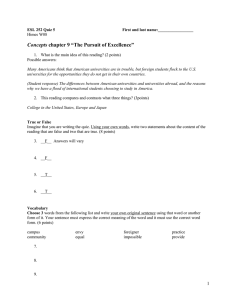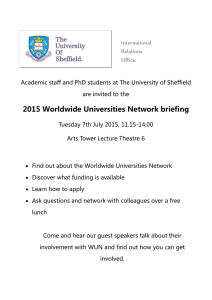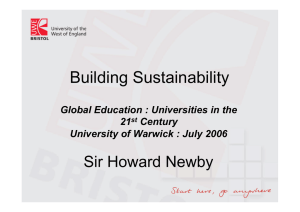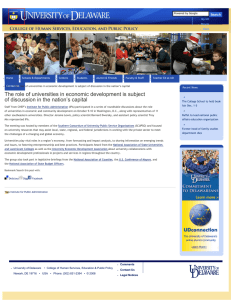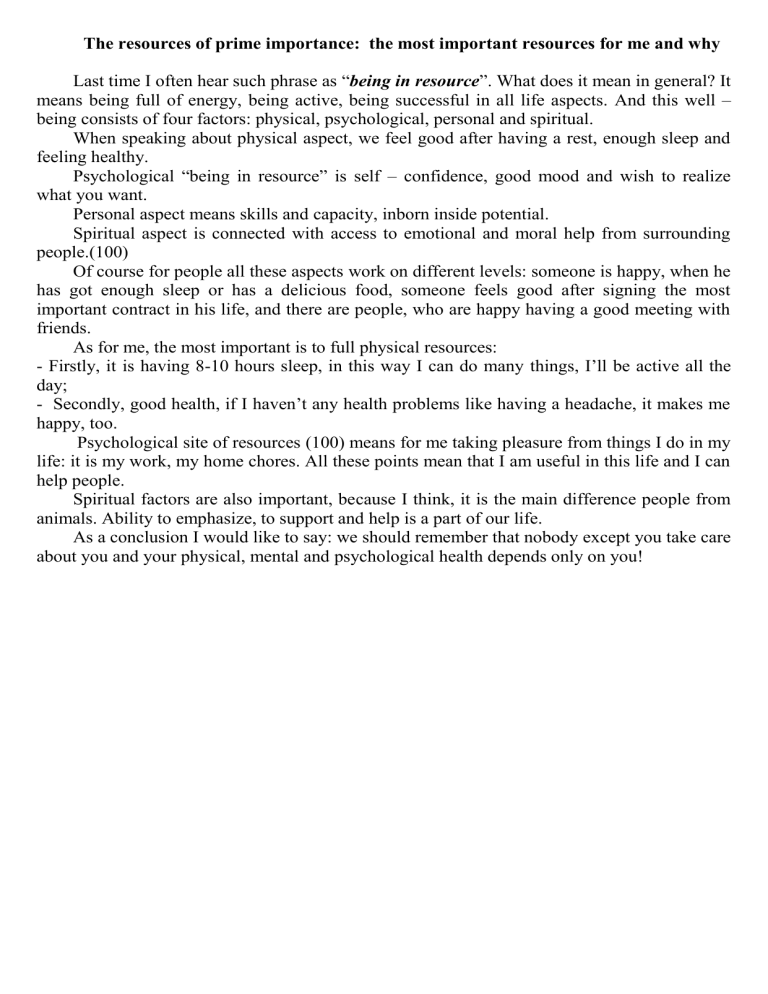
The resources of prime importance: the most important resources for me and why Last time I often hear such phrase as “being in resource”. What does it mean in general? It means being full of energy, being active, being successful in all life aspects. And this well – being consists of four factors: physical, psychological, personal and spiritual. When speaking about physical aspect, we feel good after having a rest, enough sleep and feeling healthy. Psychological “being in resource” is self – confidence, good mood and wish to realize what you want. Personal aspect means skills and сapacity, inborn inside potential. Spiritual aspect is connected with access to emotional and moral help from surrounding people.(100) Of course for people all these aspects work on different levels: someone is happy, when he has got enough sleep or has a delicious food, someone feels good after signing the most important contract in his life, and there are people, who are happy having a good meeting with friends. As for me, the most important is to full physical resources: - Firstly, it is having 8-10 hours sleep, in this way I can do many things, I’ll be active all the day; - Secondly, good health, if I haven’t any health problems like having a headache, it makes me happy, too. Psychological site of resources (100) means for me taking pleasure from things I do in my life: it is my work, my home chores. All these points mean that I am useful in this life and I can help people. Spiritual factors are also important, because I think, it is the main difference people from animals. Ability to emphasize, to support and help is a part of our life. As a conclusion I would like to say: we should remember that nobody except you take care about you and your physical, mental and psychological health depends only on you! About Bologna Declaration in KZ In March 2010, Kazakhstan officially joined the Bologna Declaration and became the 47th member of the European Higher Education Area and the first Central Asian state to be recognized as a full member of the European Educational Area. After joining the Bologna Process, Kazakhstan's higher education system has undergone major changes: 1. Kazakhstan's universities have joined the Great Charter of Universities, which is currently signed by more than 650 universities around the world, which will bring domestic education closer to European standards. More than 60 Kazakh universities have signed the Magna Carta. The Magna Carta of Universities is a document that was originally signed by 388 rectors and university leaders from across Europe and beyond on 18 September 1988, the 900th anniversary of the University of Bologna. It contains the principles of academic freedom and institutional autonomy as a guide for the proper governance of universities. 2. The transition to a three-level model of training specialists: bachelor-master-Doctor Ph.D., based on the principles of the Bologna Declaration. In 16 universities, Ph.D. doctors are being trained in partnership with leading foreign universities. 4. The ECTS (European Credit Transfer System) has been adopted as the basis for the transfer of credits in the course of academic mobility of students, and the new ECTS Guidelines (approved at the Yerevan Conference of Ministers of Education of European Countries on May 14-15, 2015) are being implemented. 5. The Ministry of Education and Science of the Republic of Kazakhstan allocates funds for academic mobility of teaching staff and students, and universities themselves allocate funds for academic mobility. According to the official data of the Center for the Bologna Process and Academic Mobility, in 2014, 1726 foreign scientists were invited by 52 universities (2013 – 1533 people, 2012-1 349 people, 2011-1717 people, 2010-418 people, 2009-389 people). The invitation of foreign teachers and consultants is carried out within the framework of the state order and at the expense of extra-budgetary funds of universities. Международная программа по оценке качества обучения PISA (Programme for International Student Assessment) проводится раз в 3 года, начиная с 2000 г., и проходит под патронажем Организации экономического сотрудничества и развития. Цель этого масштабного тестирования — провести оценку грамотности 15-летних школьников в разных видах учебной деятельности: естественнонаучной, математической, компьютерной и читательской. Помимо PISA существуют и другие международные мониторинговые исследования, имеющие более узкую направленность. Тестирование TIMSS (Trends in Mathematics and Science Study), например, нацелено на проверку качества математического и естественнонаучного образования учеников четвёртых и восьмых классов. Проводится оно при поддержке Международной ассоциации по оценке учебных достижений IEA.

